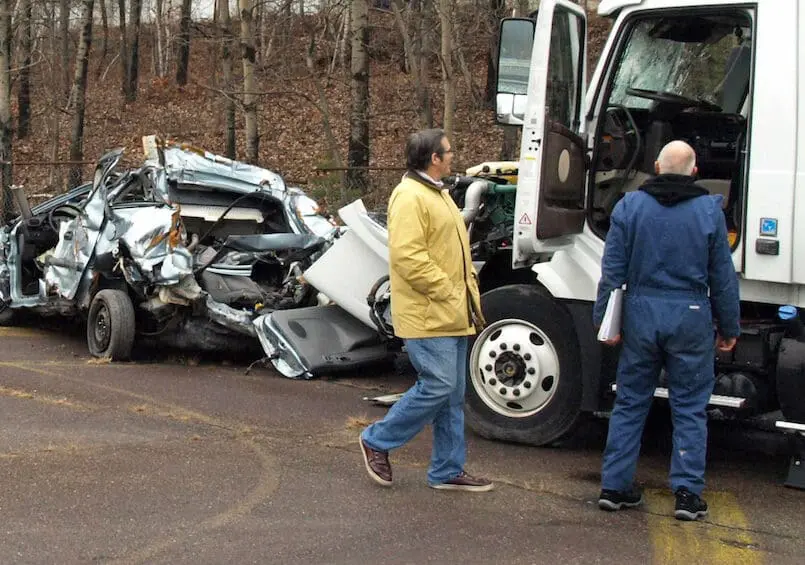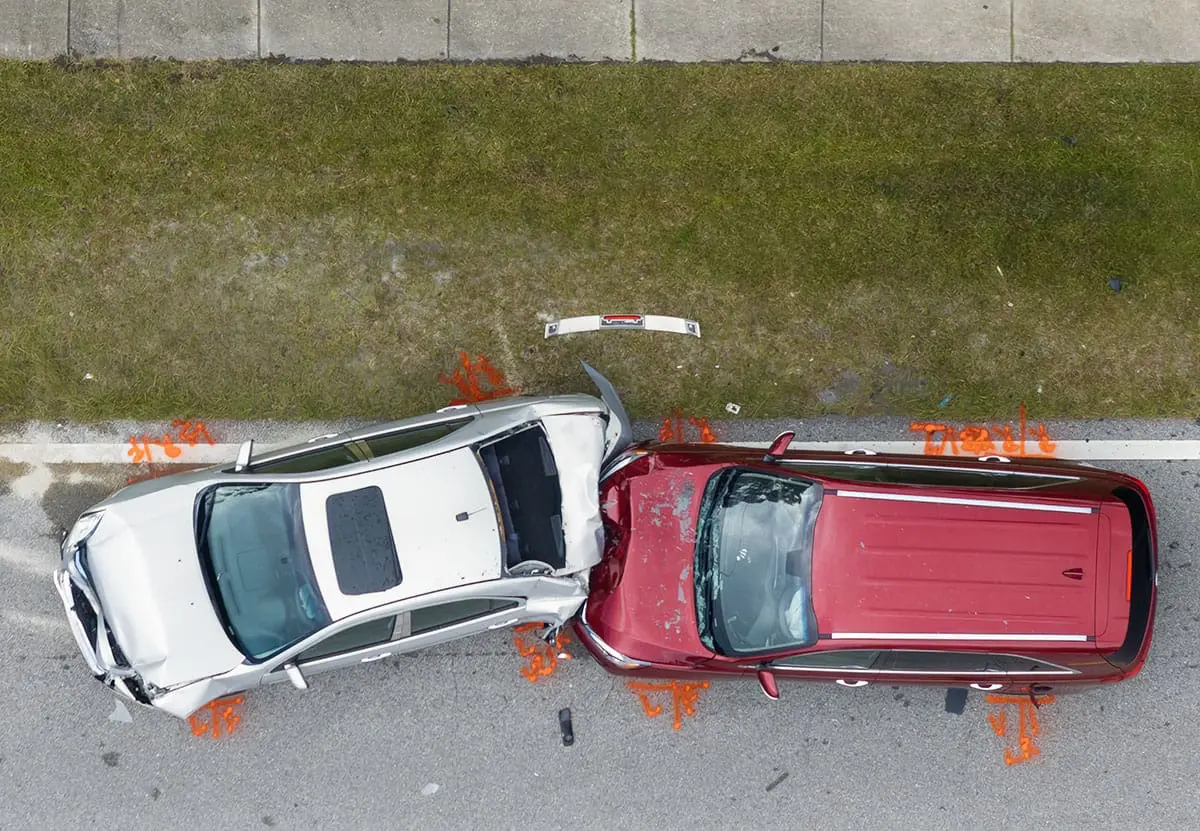If you get into an accident in a work vehicle, personal insurance may or may not play a factor in the compensation you deserve. There are a number of various factors which will inform which insurance policies that may or may not come into effect in such a situation. If you were driving a company car, then the employer’s insurance policy most likely comes into play. Your own insurance policy might offer specific coverage as well. Other avenues to explore would be workers compensation and the policies of any of the other drivers involved in the accident. When you’re injured in a work vehicle accident in Pennsylvania, one of the most confusing questions you’ll face is which insurance policy will cover your claim.
The answer depends on several critical factors: who owns the vehicle, what you were doing when the accident occurred, and who caused the crash. At Munley Law, we’ve helped Pennsylvania workers navigate these complex insurance questions for over 60 years, and we understand how overwhelming it can feel when you’re dealing with medical bills, lost wages, and competing insurance companies.

Which Insurance Pays for Work Vehicle Accidents?
The first step in any Pennsylvania work vehicle accident claim is determining which insurance policy has primary responsibility for your damages. This decision affects everything from your medical coverage to your compensation amount, so getting it right is crucial.
When you’re driving a company-owned vehicle, your employer’s insurance typically serves as the primary coverage. This applies whether you’re driving a delivery truck, company car, or any vehicle owned by your employer. Pennsylvania law requires employers to carry commercial auto insurance for company vehicles, and this coverage should handle property damage, medical expenses, and liability claims arising from work-related accidents.
However, the situation becomes more complex when you’re using your personal vehicle for work purposes. If you’re driving your own car to make deliveries, visit clients, or travel between work sites, your personal auto insurance may be the primary coverage. Many personal auto policies include business use exclusions, which means your insurer might deny coverage if they determine the accident occurred during commercial activities.
In some Pennsylvania work vehicle accident cases, both your personal insurance and your employer’s commercial policy may apply. This typically happens when your personal policy doesn’t fully cover the damages, and your employer carries non-owned auto insurance. This secondary coverage can help fill gaps in your personal policy, but determining which policy pays first often requires legal expertise.
Workers’ compensation insurance adds another layer of complexity to Pennsylvania work vehicle accident claims. Unlike traditional auto insurance, workers’ compensation covers you regardless of who caused the accident, as long as you were acting within the scope of your employment. This no-fault system can provide immediate medical coverage and wage replacement benefits while other insurance claims are being sorted out.
Your Complete Compensation Guide: Workers’ Comp vs. Personal Injury Claims
Understanding the difference between workers’ compensation and personal injury claims is essential for Pennsylvania work vehicle accident victims. These two types of claims serve different purposes and provide different types of compensation, and in some cases, you may be eligible for both.
Workers’ compensation benefits in Pennsylvania are designed to provide immediate medical care and partial wage replacement without requiring you to prove fault. For work vehicle accidents, workers’ compensation typically covers all medical expenses related to your injuries, including doctor visits, hospital stays, surgery, medications, and rehabilitation. You’ll also receive wage loss benefits equal to two-thirds of your average weekly wage, up to the state maximum, which is adjusted annually.
If your work vehicle accident resulted in permanent injuries, you may also be eligible for specific loss benefits under Pennsylvania workers’ compensation law. These benefits are paid for predetermined periods based on the type and severity of your injury, even if you’re able to return to work. For example, the loss of a hand provides benefits for 335 weeks, while significant scarring or disfigurement may qualify for additional compensation.
Personal injury claims, on the other hand, become available when someone other than your employer caused your work vehicle accident. If another driver ran a red light and hit your delivery truck, or if a defective vehicle part contributed to your crash, you may be able to pursue a personal injury lawsuit against the responsible party. These claims can provide compensation that workers’ compensation doesn’t cover, including pain and suffering, full wage loss, and future medical expenses.
The key advantage of personal injury claims in Pennsylvania work vehicle accidents is that they’re not subject to the same benefit caps as workers’ compensation. While workers’ comp provides two-thirds of your wages, a successful personal injury claim can recover your full lost income, both past and future. Personal injury claims also compensate you for non-economic damages like pain, suffering, and loss of enjoyment of life.
In many Pennsylvania work vehicle accident cases, pursuing both workers’ compensation and personal injury claims provides the most comprehensive recovery. Workers’ compensation gives you immediate medical coverage and wage replacement while your personal injury case develops, which can take months or even years to resolve.

Pennsylvania Work Vehicle Accident Liability: Who Pays When?
Determining liability in Pennsylvania work vehicle accidents requires understanding the state’s comparative negligence law and how it applies to workplace situations. Pennsylvania follows a modified comparative negligence rule, which means you can recover damages as long as you’re less than 51% at fault for the accident.
When another driver causes your work vehicle accident, liability is often straightforward. If someone rear-ends your delivery truck while you’re stopped at a traffic light, that driver’s insurance should cover your damages. However, work vehicle accidents frequently involve multiple parties, making liability determination more complex.
Your employer may bear some responsibility for your Pennsylvania work vehicle accident if they failed to properly maintain the vehicle, required you to drive in unsafe conditions, or didn’t provide adequate training. Employers have a legal duty to ensure their vehicles are safe and roadworthy, and failure to meet this obligation can result in liability for resulting accidents.
Vehicle manufacturers and parts suppliers can also be liable for work vehicle accidents caused by defective components. If faulty brakes, defective tires, or other mechanical failures contributed to your accident, you may have a product liability claim against the manufacturer. Such cases often require extensive investigation and expert testimony to prove the defect and its role in causing the accident.
In Pennsylvania work vehicle accidents involving multiple parties, liability is often shared among several defendants. For example, if you were driving a poorly maintained company truck when another driver ran a stop sign, both the other driver and your employer might share responsibility for your injuries. Pennsylvania’s comparative negligence law allows you to recover damages from all responsible parties, with each paying their proportionate share.
Insurance companies play a crucial role in liability determination for Pennsylvania work vehicle accidents. Commercial insurance providers often conduct thorough investigations, including accident reconstruction, vehicle inspections, and witness interviews. However, insurance companies have financial incentives to minimize their liability, which is why having experienced legal representation is crucial for protecting your rights.
Critical Steps After a Pennsylvania Work Vehicle Accident
The actions you take immediately after a Pennsylvania work vehicle accident can significantly impact your ability to recover compensation. While your first priority should always be getting medical attention for any injuries, there are several time-sensitive steps that can protect your legal rights and strengthen your claim.
Reporting your work vehicle accident to your employer is required by Pennsylvania law and must be done within 120 days to preserve your eligibility for workers’ compensation benefits. However, it’s best to report the accident immediately, even if your injuries seem minor. Many work-related injuries, particularly soft tissue injuries like whiplash, may not manifest symptoms for hours or days after the accident.
Medical documentation is crucial for any Pennsylvania work vehicle accident claim. Even if you feel fine after the accident, you should see a doctor as soon as possible. Some injuries, including concussions and internal injuries, may not cause immediate symptoms but can have serious long-term consequences. Your medical records will also serve as important evidence in both workers’ compensation and personal injury claims.
Gathering evidence at the accident scene, if you’re able to do so safely, can be invaluable for your Pennsylvania work vehicle accident claim. This includes taking photographs of the vehicles, the accident scene, any visible injuries, and road conditions. If there were witnesses, try to get their contact information, as their testimony may be crucial for establishing liability.
When dealing with insurance companies after your Pennsylvania work vehicle accident, it’s important to be cautious about what you say and what you sign. Insurance adjusters may contact you quickly after the accident, seeking recorded statements or asking you to sign forms. While you should cooperate with your own insurance company, you should be careful about providing detailed statements to other insurers without legal representation.
Pennsylvania’s statute of limitations gives you two years from the date of your work vehicle accident to file a personal injury lawsuit against responsible third parties. While this may seem like plenty of time, building a strong case often requires months of investigation, medical treatment, and legal preparation. The sooner you begin the process, the better your chances of achieving a favorable outcome.

Industry-Specific Work Vehicle Accident Claims
Different industries in Pennsylvania present unique challenges and opportunities for work vehicle accident claims. Understanding how your specific type of work affects your claim can help you navigate the insurance and legal processes more effectively.
Delivery drivers face some of the highest risks for work vehicle accidents in Pennsylvania. Whether you’re delivering packages for Amazon, food for DoorDash, or products for a local business, you’re constantly exposed to traffic hazards. Delivery drivers often have complex insurance situations, as they may be classified as independent contractors rather than employees, affecting their workers’ compensation eligibility and insurance coverage.
Field service workers, including utility workers, HVAC technicians, and plumbers, often drive company vehicles loaded with tools and equipment. These workers face unique risks from heavy cargo that can shift during accidents, potentially causing additional injuries. Pennsylvania work vehicle accident claims for field service workers often involve questions about whether accidents occurred during regular work duties or personal activities.
Transportation and logistics workers, including truck drivers and warehouse delivery personnel, are subject to federal regulations that can affect their Pennsylvania work vehicle accident claims. Commercial driver’s license requirements, hours of service regulations, and vehicle inspection standards all play roles in determining liability and compensation in these cases.
Sales representatives and other professionals who use personal vehicles for business purposes face particular challenges in Pennsylvania work vehicle accidents. Many personal auto insurance policies contain business use exclusions, which can leave these workers without coverage if their insurance provider determines the accident occurred during commercial activities. Understanding your policy’s limitations and your employer’s non-owned auto coverage is crucial for these workers.
Pennsylvania Work Vehicle Accident Settlement Values and Case Results
The value of your Pennsylvania work vehicle accident claim depends on numerous factors, including the severity of your injuries, the extent of your financial losses, and the degree of fault attributed to each party. Understanding these factors can help you evaluate settlement offers and make informed decisions about your case.
Medical expenses typically form the foundation of any Pennsylvania work vehicle accident claim. This includes not only your immediate medical bills but also the cost of future medical care related to your injuries. In serious accident cases, lifetime medical expenses can reach hundreds of thousands of dollars, making accurate medical projections crucial for fair compensation.
Lost wages represent another significant component of Pennsylvania work vehicle accident claims. Workers’ compensation provides two-thirds of your average weekly wage, but personal injury claims can recover your full lost income. For high-earning professionals or workers with decades of career potential ahead of them, lost wage claims can be substantial.
Pain and suffering damages, which are only available through personal injury claims, can significantly increase the value of your Pennsylvania work vehicle accident case. These non-economic damages compensate you for the physical pain, emotional distress, and reduced quality of life caused by your injuries. Pennsylvania courts have awarded substantial pain and suffering damages in serious work vehicle accident cases.
The strength of the liability case against the responsible parties also affects settlement values in Pennsylvania work vehicle accidents. Clear-cut cases where the other party was obviously at fault typically result in higher settlements than cases where fault is disputed. Insurance companies are more likely to offer fair settlements when they know they have little chance of avoiding liability at trial.
When Insurance Companies Deny Work Vehicle Accident Claims
Insurance claim denials are unfortunately common in Pennsylvania work vehicle accident cases, particularly when multiple policies are involved or when the circumstances of the accident are complex. Understanding why claims are denied and how to respond can help you protect your rights and secure the compensation you deserve.
Coverage disputes often arise when insurance companies disagree about which policy should provide primary coverage for your Pennsylvania work vehicle accident. Your personal auto insurer might argue that your employer’s commercial policy should pay, while your employer’s insurer might claim the accident wasn’t work-related. These disputes can delay your claim for months while you’re dealing with medical bills and lost wages.
Scope of employment challenges are particularly common in Pennsylvania work vehicle accident cases. Insurance companies may argue that you weren’t acting within the scope of your employment when the accident occurred, potentially excluding coverage under workers’ compensation or commercial auto policies. These arguments often arise when accidents occur during lunch breaks, while running personal errands, or when traveling to or from work.
Pre-existing condition arguments are another common reason for Pennsylvania work vehicle accident claim denials. Insurance companies may argue that your injuries were caused by pre-existing conditions rather than the accident. Medical records and expert testimony are often necessary to establish the connection between your injuries and the work vehicle accident.
When your Pennsylvania business vehicle accident claim is denied, you have several options for challenging the decision. Workers’ compensation denials can be appealed through the Pennsylvania Bureau of Workers’ Compensation, while personal injury claims may require litigation against the responsible parties. Having experienced legal representation is crucial for successfully overturning claim denials and securing the compensation you deserve.
The appeals process for denied Pennsylvania work vehicle accident claims can be complex and time-consuming. Insurance companies have teams of lawyers and claims adjusters working to minimize their liability, and challenging their decisions requires thorough knowledge of Pennsylvania law and insurance practices. An experienced work vehicle accident attorney can level the playing field and advocate for your rights throughout the appeals process.

Contact Munley Law for Your Pennsylvania Work Vehicle Accident Case
Pennsylvania work vehicle accident cases involve complex interactions between multiple insurance policies, state and federal regulations, and various legal theories. The decisions you make in the days and weeks following your accident can have lasting impacts on your ability to recover compensation and protect your rights.
At Munley Law, we understand the unique challenges faced by Pennsylvania workers injured in vehicle accidents. Our experienced attorneys have successfully handled thousands of work vehicle accident cases, recovering millions of dollars in compensation for our clients. We know how to navigate the complex insurance landscape, investigate accident causes, and build strong cases that maximize your recovery.
If you’ve been injured in a Pennsylvania work vehicle accident, don’t try to handle the insurance companies alone. Contact Munley Law today for a free consultation to discuss your case and learn about your legal options. We work on a contingency fee basis, which means you pay no attorney fees unless we recover compensation for you. Let us handle the legal complexities while you focus on your recovery.









